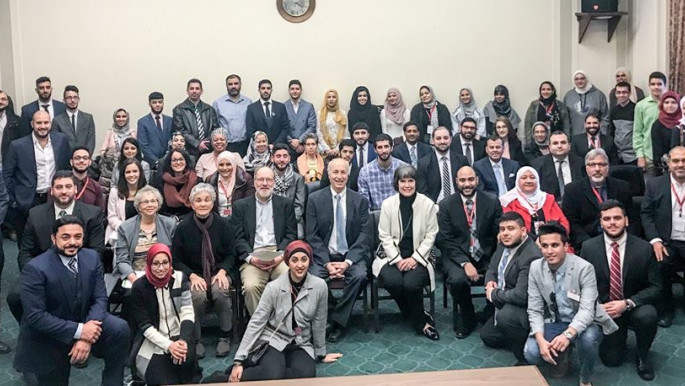
Learning how to advocate for Palestinians in DC
This annual event began with only a small number of attendees and supporters, but over the past four years the number of participants has increased significantly. The goal of the conference is to prepare the next generation of leaders, activists, and advocates for Palestine - providing them the basic tools for civic engagement with elected officials in different branches of government.
Some 250 participants of all backgrounds and faiths representing 25 states took part. In total, we met with the offices of more than 100 members of congress.
Dr Osama Abuirshaid, the national policy director at AMP, feels that the role of Palestinian Americans in the diaspora is to advocate for Palestinian rights, and create relationships to present Palestinian narratives by sharing our perspectives and stories. This complements the work of Palestinians in Palestine. The support of the international community at large and individuals around the world is more important today than ever before.
Many members of delegation attended a special meeting with congresswoman Betty McCollum (D-MN). They thanked her for sponsoring H.R.4391, a historic bill that supports Palestinian human rights, outlawing any US financial assistance to Israel from being used to military detention of Palestinian children.
According to human rights groups, 2017 was the worst year in the history of the occupation for Palestinian children being detained or arrested.
Brad Parker, a staff attorney and international advocacy officer from Defense for Children International-Palestine focused on the goal of persuading members of Congress to support AMP's legislative agenda, while also creating local groups in places of worship, spaces to talk about Palestinian rights, and partnering with other organisations.
The three key issues presented to lawmakers were:
1- Supporting H.R. 4391: The Promoting Human Rights by Ending Israeli Military Detention of Palestinian Children Act.
2- Opposing S.720: The pro-Israel Anti-Boycott Act which unconstitutionally punishes free speech.
3- Supporting the funding of UNRWA, for which the Trump Administration drastically reduced funding this year, and which is certain to have a devastating effect on the lives of Palestinian refugees, especially the half a million children who attend UNRWA schools.
Attendees met with their state representatives. Each of the state groups were trained and everyone had a role in the meeting with the government officials.
 |
| Attendees at the conference met with their respective state representatives [AMP] |
Ahmed Bedier, the president of United Voices for America said that Muslims in particular needed to prioritise civic engagement in order to get the message out regarding Palestinian human rights, their rights to live, and ending the occupation.
One workshop trained attendees to raise awareness about the importance of respecting Palestinian rights to live with dignity and ending the occupation. Speakers offered their thoughts on the importance of becoming leaders in America that lobby for Palestine. Due to the intimate relationship between Israel and the United States, pro-Palestine activists and Palestinian Americans living in the diaspora are working together to raise their voices that ask for justice and a free Palestine.
Leena Al-Arian, one of the organisers, encouraged Palestinian Americans to find more non-Muslim allies and create partnerships with other organisations that support Palestinian civil rights.
 |
Palestinians have resisted occupation in all forms of popular resistance, despite all the attempts to erase their identity |  |
Neveen Ayesh, a Palestinian American who attends law school, was one of the participants representing Missouri. She spoke about her personal experience as a Palestinian immigrant in the United States. For Neveen, most important is to share the stories we have experienced as Palestinians when we fight for human rights and freedom of speech.
Palestinians have resisted occupation in all forms of popular resistance, despite all the attempts to erase their identity. Documenting the history of Palestine before the catastrophe of 1948 and after was to reassure that Palestine is the land for Palestinians.
Stephen Bennett of the Institute for Palestine Studies, said that their approach was to support the Palestinian cause by documenting and collecting information about violations of human rights against Palestinians.
Jenan Shbat, the events and outreach manager of CAIR in DC, said that great work always comes from partnerships between organisations. She agreed that allies would support and raise more awareness. As a CAIR representative she also volunteered to offer her resources to AMP.
At a time when the president of the United States attempts to ban Muslims from entering the country and makes decisions about Jerusalem that have sparked anger throughout the Muslim world, Muslims are still active and we are optimistic.
Born and raised in Palestine, Wasan Abu Baker is a writer and academic currently based in Texas.





 Follow the Middle East's top stories in English at The New Arab on Google News
Follow the Middle East's top stories in English at The New Arab on Google News


